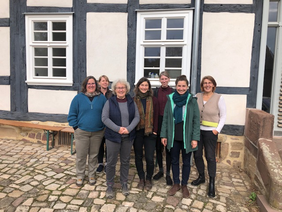One aim of the regiosöl project with the participation of the Zentrum für Ökologische Landwirtschaft e.V. (ZÖL) and the Regionalwert AG Rheinland (RWAG) was to present the concrete services and possible deficits of the pilot regions considered using the method developed in the project. The regional value performance calculation, which had previously been supplemented in the course of the project by expert workshops to include further socio-cultural services (german: "sozial-ökologische Leistungen", "SÖL")of organic agriculture, was used on 61 farms in 2021. These results as well as regional statistical evaluations were used to create regional profiles of the pilot regions and were presented at the project meeting in Northern Hesse last October. New insights can be derived from this, both in terms of regional strategy and methodology.
Among other things, the character of the cultivated landscape (grassland or arable land) as well as the existence of regional brands and strong networks can be identified as important factors for the respective performance priorities of the regions. Weaknesses can be identified in particular in the lack of corresponding guidelines, communication and promotion. From a methodological point of view, it was found that farm surveys are hardly suitable for an evaluation of regions, as many services lie within the spectrum of individual farm decisions. On the other hand, the required regional statistical data, e.g. on training places in the food trade, were available in the regions in varying degrees of detail and quality.
Suitable recommendations for action were identified for both regions in order to record and communicate SÖL and to create favourable conditions. Before the project ends in April 2023, it is planned to underpin these results in an expert workshop with policy recommendations for securing, recognising and expanding organic farming.
The policy recommendations as well as information material to raise awareness of the manifold social, ecological and regional economic benefits will be published at the end of the project. Current and further information is available at www.ifls.de/referenzen/regiosoel/.
Contact persons at IfLS: Simone Sterly (sterly[at]ifls.de), Ribana Bergmann (bergmann[at]ifls.de)
